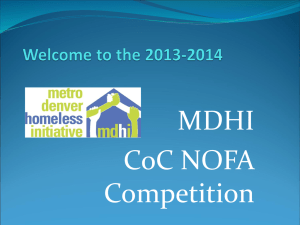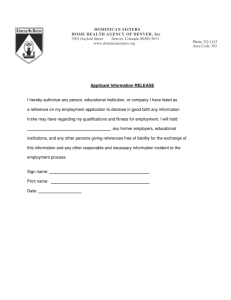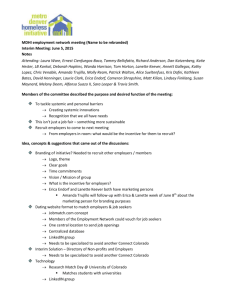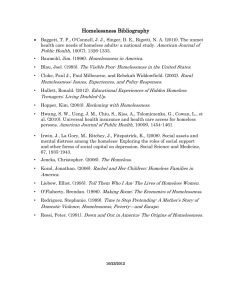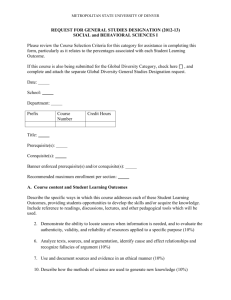MDHI Board Application and Information Packet
advertisement
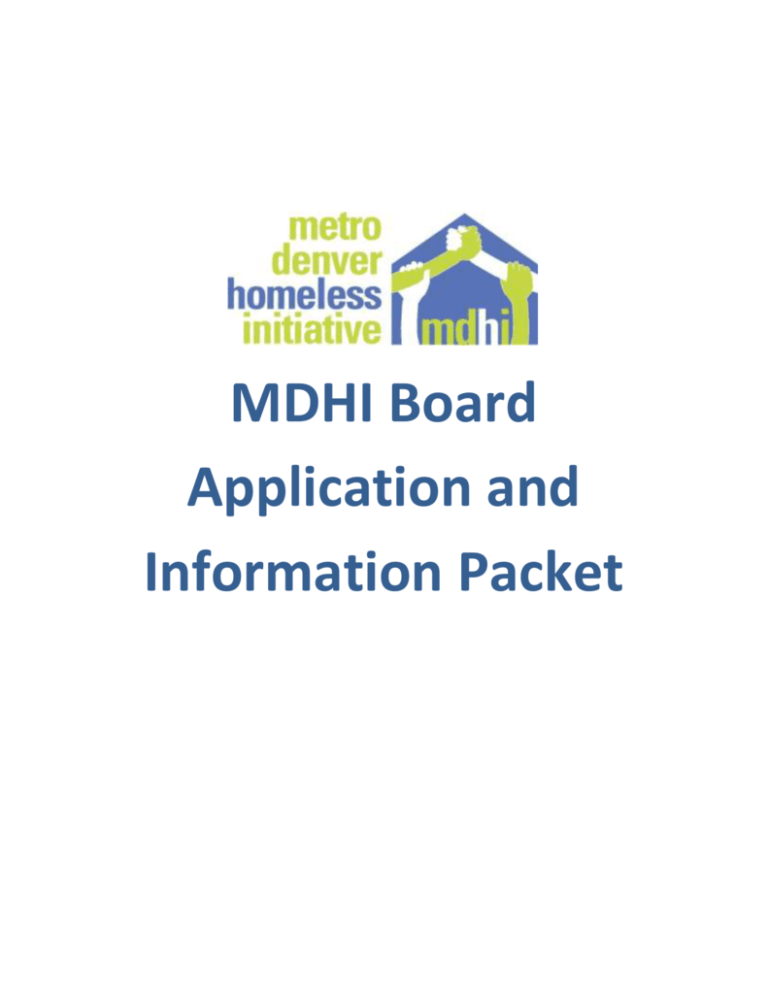
MDHI Board Application and Information Packet Metropolitan Denver Homeless Initiative Background The mission of Metropolitan Denver Homeless Initiative (MDHI) is to implement a comprehensive homeless housing and service Continuum of Care (CoC) system in the seven-county metropolitan region surrounding Denver. A Continuum of Care is a regional system for helping people who are homeless or at imminent risk of homelessness by ensuring that appropriate housing and services are available. The Metropolitan Denver Continuum of Care includes prevention, outreach and assessment, emergency shelter, transitional housing, supportive services, permanent supportive housing and permanent housing. MDHI works closely with each county in its continuum (Adams, Arapahoe, Boulder, Broomfield, Denver, Douglas and Jefferson) to ensure that planning groups have the resources and support that they need to move forward with planning and implementation of strategies to end homelessness. The three main programs of Metropolitan Denver Homeless Initiative include: Regional Needs Assessment and Service Planning MDHI leads the process for the annual HUD SuperNOFA application. Each year MDHI convenes a series of meetings for metropolitan stakeholder to identify local service gaps and metropolitan homeless priorities. Identified priorities are used to develop a comprehensive application to the U.S. Department of Housing and Urban Development (HUD). Since its inception, MDHI has brought in over $100 million in grants for the Denver metropolitan area. While MDHI facilitates this funding, none of these funds benefit MDHI, which is responsible for its own resource development. Conducting and Disseminating Research MDHI conducts a point in time survey in January and then issues a report which provides the community with current information on the status of homelessness in the Denver metropolitan area. MDHI also oversees the implementation of the Homeless Management Information System (HMIS) for the seven county Denver metro region. Strategic Community Organizing MDHI’s Coordinating Committee actively works with individual counties and cities within the Continuum of Care (CoC) to assist them to build strategies and to create their own plans to end homelessness. The long-term goal of MDHI’s coordinating efforts is to develop a regional plan to end homelessness. MDHI Mission and Vision Statements Mission To coordinate and support the Denver Metro Continuum of Care (C0C)* to ensure the most efficient and effective services to reduce homelessness in the seven-county region *CoC is defined as the collaboration of stakeholders which provide a continuum of services to address homelessness. Vision Guiding Principles Serving homeless citizens with humanity, fairness and justice Implementing programs in an atmosphere of mutual respect between participants and providers Offering service and treatment choices to participants, based on their own uniqueness and personal preferences Actively including homeless citizens in planning and decision-making processes Respecting and celebrating diversity of opinion, culture, race and gender Encouraging self-sufficiency and personal responsibility MDHI Role Coordinating o Coordinating among diverse stakeholders in seven-county region Planning o Ensuring data-driven, evidence-based plans that address gaps and eliminate inefficiencies of services Capacity building o Creating an environment and the resources for greater collective success Contact: Gary Sanford – Executive Director Gary.sanford@mdhi.org 303-561-2193 Board Meetings All members of the Board of Directors are expected to regularly attend and actively participate in Board meetings. Meeting times: 2nd Thursday of each month, Mile High United Way Founders’ Room, 2505 18th Street, Denver, CO 80211 from 2:00-4:00PM Committee Opportunities Committees are groups that meet to create programs, craft documents and plans, make decisions, and carry out activities. Each Board member is expected to actively participate in one Board committee. Committees and meeting times are listed below: Executive Committee-The MDHI Executive Committee consists of the president, vice president, secretary, treasurer and immediate past president. This committee meets monthly prior to the Board meeting to set the Board agenda and to oversee the CoC process. Meeting time: 1st Thursday of each month, MHUW, Barb Room, 3:00pm-4:30pm Finance Committee – The MDHI Finance committee reviews MDHI income and expenditures, develop, review and oversee financial systems and operations, and assist in identifying and securing operational funds. Meeting time: TBD MDHI Coordinating Committee and CoC Advisory Groups --MDHI has identified the Coordinating Committee as the responsible entity for several 2014/2015 CoC goals. The Coordinating Committee provides leadership for several CoC Advisory Groups. CoC Advisory Groups o o o o o Coordinated Entry and Assessment Housing Prevention Employment Mainstream Benefits Meeting time: Fourth Friday of each month from 9-11am at MHUW HMIS Policy Committee The purpose of this committee is to recommend policy and procedures for the Homeless Management Information System (HMIS) for the metro Denver region. A Homeless Management Information System (HMIS) is a software application designed to record and store client-level information on the characteristics and service needs of homeless persons. Homeless assistance providers use HMIS to coordinate care, manage their operations, and better serve their clients. Meeting time: first and third Wednesday of each month, MHUW, 9:00-11:00AM NOFA Review Committee- MDHI leads the process for the 7-county annual HUD CoC NOFA application. Each year MDHI brings in approximately $16 million to the metro Denver area. As part of the application process, this committee plans large stakeholder meetings, establishes priorities, and sets criteria for final project rankings. Meeting time: meetings are held at MHUW, meeting times vary Governance Committee-The Governance Committee actively recruits new Board members, interviews prospective candidates, and recommends a slate of candidates to the Board for yearly elections and as vacancies arise. The Governance Committee also will also provide leadership and oversight of development and implementation of a CoC Governance Charter. Meeting time: meetings are held at MHUW, fourth Monday of every month from 2:00 – 4:00 Board of Directors Board Members: The governing body of MDHI is the Board of Directors. The Board establishes policy and directs the activities of the organization and committees. Members govern the overall direction of MDHI and provide input and resources to the organization’s programs. Participation in a leadership role offers a chance to be a key player in shaping the future of MDHI and to gain practical leadership experience, along with developing a network of professional contacts. The Board reviews and makes recommendations regarding committee activities, approves policies, and makes decisions regarding organizational finances. Board members serve as officers, committee chairs or appointed representatives. Members are elected to serve two-year terms with an option to renew for an additional two years. The Board meets monthly and members are required to regularly attend and actively participate in Board meetings. Board Members are expected to: Attend meetings regularly Provide input to operations Participate in at least one committee As able, participate in trainings, events, and fundraising efforts Promote MDHI to colleagues and community Qualifications: Time availability (estimated six hours monthly, ten for officers) Working knowledge of MDHI Ability to contribute to development of MDHI Current or past experience with homeless issues is beneficial Board Officers: A slate of officers is recommended by the Governance Committee. Officers serve a term of one year for up to two consecutive terms, as elected by the Board. Officers (President, Vice president, Secretary, Treasurer) also serve as members of the Executive Committee to provide input and support regarding board development, organizational planning and financial management. Board Officer Qualifications: Current MDHI member in good standing. Ability to devote several hours monthly to service as an officer. Commitment to the MDHI work and its values as well as an understanding of its objectives, organization, and services. Ability to articulate ideas and contribute to the organization’s management systems and planning. Qualities: Organized Flexible Dependable Demonstrates leadership Has good communication skills Stays on task Has public speaking experience Board of Directors Application Name: Address: Phone: Email: Business: Address: Phone: Email: What is your interest in or experience with homelessness? Why would you like to be a member of the MDHI Board? What strengths, skills, and qualities would you bring to the Board? Have you been involved with MDHI in the past? On which committee would you like to serve? List two references who can speak to your interest in homelessness: Name: Phone: Email: Name: Phone: Email: Please add any other information you think would be relevant to membership on the MDHI Board. Please submit completed applications to Rebecca Mayer at rebecca.mayer@mdhi.org.
